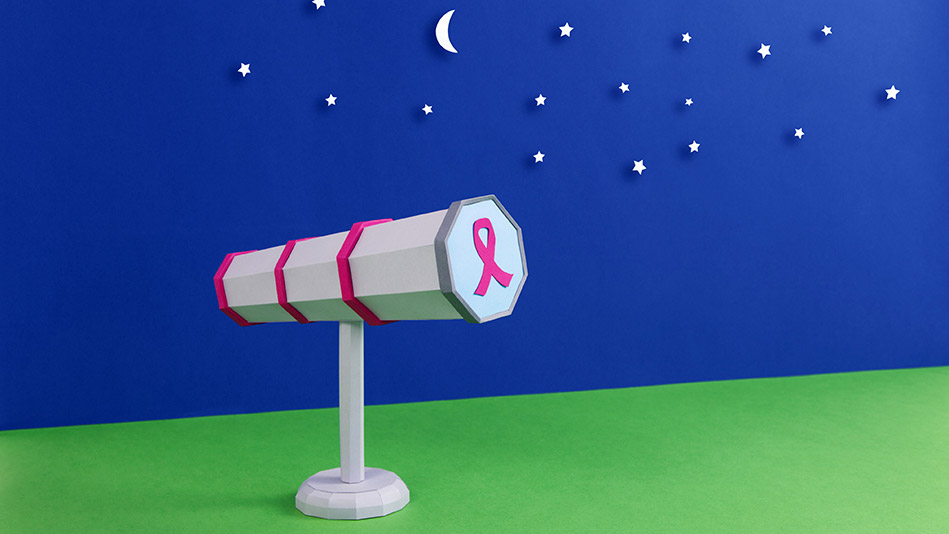How Cancer Treatment Is Changing
Doctors are now treating breast cancer patients with a focus on the future.

Illustration by Noelia Lozano
When Bree Sandlin was diagnosed with stage III triple-negative breast cancer at 37, she worked full-time in marketing for a major corporation and was the mother of 5-year-old twin boys, one of whom had cerebral palsy. "I didn't have time to be sick," she says.
Triple-negative breast cancer is more aggressive than other forms, but research has shown it can respond well to chemotherapy. When considering the particular treatment to recommend, Sandlin's oncologist factored in her personal and professional commitments. "The drug she suggested took less time to inject and tended to have fewer side effects during the first round," says Sandlin, who's now 41 and has been in remission for three years. "It gave me more time to keep up at home and work, so I went for it."
These days, that scenario—doctors weighing a patient's lifestyle when making treatment decisions—is increasingly common, as oncologists expand their focus from merely keeping patients alive to preserving the quality of their lives. This is as it should be: Breast cancer, after all, is no longer a death sentence. The overall ten-year survival rate is 83 percent; the 15-year rate, 78 percent. For cancer that's diagnosed before it spreads beyond the breast, the five-year survival rate is 99 percent. "It goes without saying that we must fight cancer to the best of our ability," says Jennifer Keating Litton, MD, associate professor of breast medical oncology at the University of Texas MD Anderson Cancer Center, where Sandlin was treated. "But what's exciting today are the developments that let us pull back when we can."
The breakthroughs start at diagnosis: Breast cancer patients can undergo tests, such as MammaPrint, which determines the likelihood of tumors' recurrence and can potentially spare women unnecessary rounds of treatment; they may also choose chemo regimens that minimize the risk of early-onset menopause. "When you realize that it might take more than a year to recover from the side effects of treatment, you begin to see why it's so important for women to be involved in the decision-making process," says Patricia Ganz, MD, professor at UCLA's David Geffen School of Medicine and member of the Breast Cancer Research Foundation's scientific advisory board. "I want women to prepare for the best possible life—physically and emotionally—after cancer."
Triple-negative breast cancer is more aggressive than other forms, but research has shown it can respond well to chemotherapy. When considering the particular treatment to recommend, Sandlin's oncologist factored in her personal and professional commitments. "The drug she suggested took less time to inject and tended to have fewer side effects during the first round," says Sandlin, who's now 41 and has been in remission for three years. "It gave me more time to keep up at home and work, so I went for it."
These days, that scenario—doctors weighing a patient's lifestyle when making treatment decisions—is increasingly common, as oncologists expand their focus from merely keeping patients alive to preserving the quality of their lives. This is as it should be: Breast cancer, after all, is no longer a death sentence. The overall ten-year survival rate is 83 percent; the 15-year rate, 78 percent. For cancer that's diagnosed before it spreads beyond the breast, the five-year survival rate is 99 percent. "It goes without saying that we must fight cancer to the best of our ability," says Jennifer Keating Litton, MD, associate professor of breast medical oncology at the University of Texas MD Anderson Cancer Center, where Sandlin was treated. "But what's exciting today are the developments that let us pull back when we can."
The breakthroughs start at diagnosis: Breast cancer patients can undergo tests, such as MammaPrint, which determines the likelihood of tumors' recurrence and can potentially spare women unnecessary rounds of treatment; they may also choose chemo regimens that minimize the risk of early-onset menopause. "When you realize that it might take more than a year to recover from the side effects of treatment, you begin to see why it's so important for women to be involved in the decision-making process," says Patricia Ganz, MD, professor at UCLA's David Geffen School of Medicine and member of the Breast Cancer Research Foundation's scientific advisory board. "I want women to prepare for the best possible life—physically and emotionally—after cancer."



